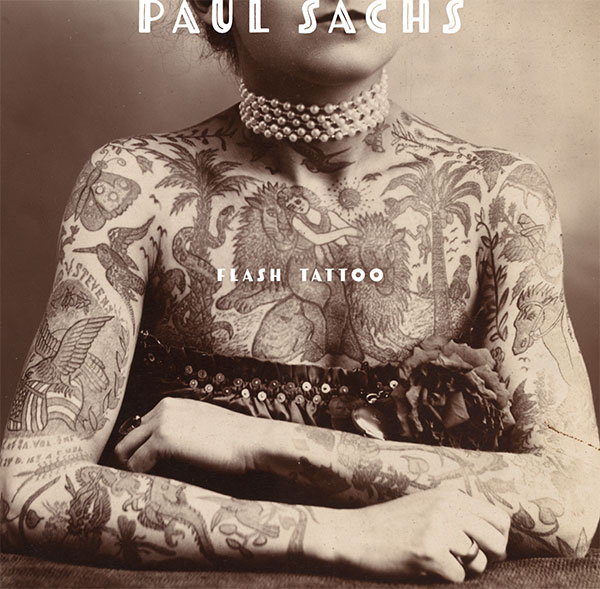 Flash Tattoo — Paul Sachs
Flash Tattoo — Paul Sachs
Some weeks ago I listened to the latest album from Paul Sachs, Flash Tattoo. The by-now expected lyrical and musical masterpiece did not disappoint. One track, “No Place Special” has been uploaded to band camp. Listen here, while waiting for the album’s release.
Paul Sachs proves once again that he is a master of his craft.
Often it seems that the overriding force behind his songwriting is his sense of social justice. However, the songs on Flash Tattoo appear to feed off getting back to the pleasures of living (as opposed to merely surviving). Perhaps, inside the covid pandemic, Sachs has found a quieter contemplative place inside himself.
His knack for creating lyric poetry is certainly intact — as well as his rugged, full-chested vocals.
On track one, “Fresh Start,” over a gently rolling fingerpicking pattern, Sachs wishes the listener (and maybe himself) the ability to “find your true North” where “all good things travel forth” and “in your soul a sword and shield made from the scars that never healed.”
Track two, “No Place Special,” is steeped in atmosphere; “an empty diner in a no-name town” and “an empty dirt road with nobody around … an old gas station on a lost highway.” A wish for a release from all the madness surrounding us these days? The pedal steel and the sleepy, loping acoustic guitar brings us right to the middle of nowhere — exactly where Sachs wants us … and himself: “I feel these things inside of me. No place special’s where I long to be.”
Track three, “Bang Bang,” a paean to a female muse, has enough clever metaphor to satisfy any Nashville composer: “She’s a walkin’ grenade, I’m pullin’ her pin …” The thumping bass and twangy lead guitar help to create a Nashvillian air.
In track four, the humorous title song, “Flash Tattoo,” the narrator ponders his impulsive nature. He remembers how his mother said not to eat so fast, but she had a tattoo herself, a green cat with pink eyes. Perusing samples on the tattoo parlor wall, he muses, “Soon I’ll be a piece of art.”
Track five, “I Wish I Was a Cowboy,” is a painting of a memory born of Zane Gray novels read as a child. In addition to the usual night campfire scene, we hear the not-so-usual, “my clothes covered in red dust, riding through fierce lighting storms, my spurs would turn to rust.”
Track six, “Earth Day 1990,” pulls forth a gauzy, wry memory of a day in Central Park, where thousands of long-haired youth gathered to ostensibly raise awareness of the needs of Mother Earth. As our narrator tells it, over a softly picked guitar, this was done to the accompaniment of rock music and lots of mood-altering substances; “We smoked mother nature and all of us got stoned … I said something about climate change, then we started dancing on the grass, I’d forgotten why we came …” The song ends on rueful note as balloons are released “into the hemisphere and all that youth would allow, into the smiling future, into the here and now.”
Track seven, “Under the Sanibel Sun,” like a three-minute John D. MacDonald novel, tells a mordant tale of human folly as a boozy character goes on an outing in the Bay of Mexico with his wife. He assures the wife, dubious about his boating skills, that the rental boat is “the same as a car that floats.” The inevitable wreck follows: “I didn’t know a reef could make a ripping sound in a hull.” Now alone, marriage over, blaming everyone but himself he opines: “Now a drunk never tells the truth and I’m livin’ proof, I blame my ex-wife, the boat and even the god-damn sea …” We all know someone like this, but our tales are seldom this colorful.
Track eight, “Broken Guitar,” extols second chances and resurrections. Our narrator, a poor man, passing by some trash, sees the guitar: “I found it one night, ‘neath the streetlight, under a ravaged moon,” and (I savor this line) “I slowed down real fast.” He takes it home and repairs it, wondering: “Who owned this old six-string? … Did they die or give up or run out of luck? Tell me why should I care? If they gave up their dreams or found better things, we’re all in need of repair.” The song ends as it began: “I got a broken guitar. Somehow we both stay in tune …” The playing on this, and throughout, shows Sachs’ love and mastery of the instrument.
Track nine, “Beyond the Bloodline” celebrates the community we build around ourselves, outside of the one we’re born into. Those: “whom I suppose are my tribe. Misfits and outlaws who traveled with me, now they’re buried in this heart of mine.” Of one who helped him learn to play, he sings: “Never got to say thank you or goodbye, but tonight I’m lettin’ my love shine, beyond the bloodlines.”
On the last track, “Love Owns Me,” in a cascade of interconnecting elements that weave through a lifetime, Sachs observes, “The sun owns the moon, the sky owns the rain, the night owns the stars, hurt owns pain. The earth owns all of us, no one is free, I know in my heart, love owns me.” As with every Sachs-penned song, the painterly metaphors continue and arrive at the basic universal truth: “That’s why it’s fragile and frightening as hell; makes you think you’re in control, when you’re under its spell. In the stillness of the moment, one thing is true, nobody owns love, love owns you.”
I don’t know how Paul Sachs continues to surpass himself with each album, but never mind. I just hope he continues to do it.
